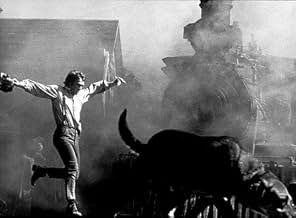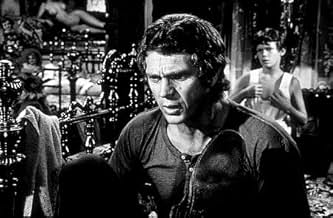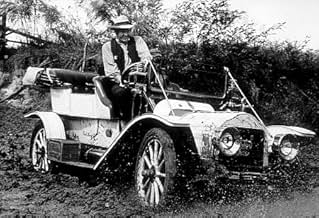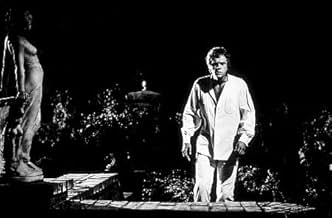No Mississippi, na virada do século, um garoto de 11 anos chega à idade adulta quando dois amigos adultos maliciosos o convencem a sair com o carro da família para uma viagem a Memphis.No Mississippi, na virada do século, um garoto de 11 anos chega à idade adulta quando dois amigos adultos maliciosos o convencem a sair com o carro da família para uma viagem a Memphis.No Mississippi, na virada do século, um garoto de 11 anos chega à idade adulta quando dois amigos adultos maliciosos o convencem a sair com o carro da família para uma viagem a Memphis.
- Direção
- Roteiristas
- Artistas
- Indicado a 2 Oscars
- 5 indicações no total
- Direção
- Roteiristas
- Elenco e equipe completos
- Produção, bilheteria e muito mais no IMDbPro
Avaliações em destaque
This was a great film written by the famous writer William Faulkner dealing with an old man going back to his youth sixty years ago. Steve McQueen, (Boon Hogganbeck) along with a few of his friends decided to take a trip from Mississippi to Memphis in an old time car which was relatively new during this period of time and taking along a very young boy named Lucius, (Mitch Vogel). Boon takes Lucius into a brothel where he stays over night in Memphis and learns a great deal about the birds and the bees and especially from a sweet kind lady named Carrie, (Sharon Farrell) who is a gal very much in love with Boon. There is a horse race and lots of laughs and drama to go along with the rest of the picture. There was a great deal of problems between the director of this film Mark Rydell and Steve McQueen, but the film was finally completed but the producer would never direct another picture with McQueen.
For a movie that starred one of the greatest box office stars of his time, based on a Pulitzer Prize-winning novel by one America's greatest writers, "The Reivers" has continued to be something of an answer to a trivia question ("In what movie did Steve McQueen portray a semi-comic character involving a stolen automobile and a horse race?") I'm not sure of the reasons myself, but this movie has remained at the top of my "Favorite Movies" list since I first saw it in 1969. Maybe it was the out-of-character role of McQueen. Maybe it was the excellence of his supporting cast that includes Mitch Vogel, Rupert Crosse and Will Geer. Maybe it was the direction by Mark Rydell. Or maybe it was the outstanding score by John Williams (which has remained my favorite movie score of all time). Most likely, it is a combination of all the above. All I can say is that this movie has never lost its appeal for me. Watching the movie is like visiting an old friend with whom the passage of time will only strengthen the bonds of affection. This movie may not be for everybody, but I recommend it on the chance that you may be smitten by its special charm.
A diverse group goes off on an adventure, each for his own reasons, and each comes back changed and much wiser. Romance, excitement, tough choices, new experiences, and a really great car -- what more can you ask for? In a just world, this would be considered a classic of the coming-of-age genre. It is one of McQueen's most complex and charming performances. Crosse, another actor who died much too young, is brilliant. It has some mature material, but it is a wonderful family movie to talk to kids 13 and up about what growing up really means.
I have not read the Faulkner story on which this is based, so I can't comment on how much of this delightful film can be credited to him (doubtless Burgess Meredith's voiceovers are Faulkner's words), but this wonderful movie about the pain of growing up is laced with plenty of adventure and fun and deserves to become a classic. The John Williams score is superb. The acting is wonderful from all the leads, including the boy. This is one of the underrated Steve McQueen's best roles, and Will Geer is perfect in the small but rich part of Boss. The characters are all wonderfully and richly fleshed out, and there are many moments of human insight. To top it off, the cinematography makes the movie simply gorgeous to look at.
Considering the movie's manifold virtues it's interesting to note that one never sees it on any of the cable channels. The reason is obvious, and it's political correctness. The movie uses the "n" word multiple times, although always in the same way Mark Twain used it, i.e. to demonstrate the inhumanity behind the use of the word. Also Corrie has her eye blackened by Boone, and Ned explains to Lucius "what better sign can a woman want from a man that he has her on his mind." All this racism and sexual violence is of course abhorrent, but the forces of political correctness would rather pretend that it never existed than to look it square in the eye.
So to see this movie you'll have to buy it on DVD, which I strongly urge you to do.
Considering the movie's manifold virtues it's interesting to note that one never sees it on any of the cable channels. The reason is obvious, and it's political correctness. The movie uses the "n" word multiple times, although always in the same way Mark Twain used it, i.e. to demonstrate the inhumanity behind the use of the word. Also Corrie has her eye blackened by Boone, and Ned explains to Lucius "what better sign can a woman want from a man that he has her on his mind." All this racism and sexual violence is of course abhorrent, but the forces of political correctness would rather pretend that it never existed than to look it square in the eye.
So to see this movie you'll have to buy it on DVD, which I strongly urge you to do.
I saw this film when I was about the same age as the main character, the boy, played by Mitch Vogel. It left a strong impression on me. The cinematography, the magnificent score by John Williams, flawless acting, and, of course, Faulkner's story, create an atmosphere that few movies achieve. In terms of acting, McQueen is probably the weakest link, but he still deserves points for successfully suppressing his characteristic squint and open-mouthed grimace -- and he is as close to lovable as he can be. The movie also has more than it's share of memorable scenes, especially between Will Geer as the grandfather and Vogel.
I would be wary of letting young children see this film. The story conveys the undercurrents of racism and sexism that existed then (and now). I was 12 when I saw it and I understood it. As a parent, be ready to explain some things, though, and preview the film.
I would be wary of letting young children see this film. The story conveys the undercurrents of racism and sexism that existed then (and now). I was 12 when I saw it and I understood it. As a parent, be ready to explain some things, though, and preview the film.
Você sabia?
- CuriosidadesThe Winton Motor Carriage Company was a real automobile manufacturer, but they never produced a "Winton Flyer" model. The vehicle in the film was created from scratch by Kenneth Howard, aka Von Dutch, especially for this movie. The car was designed to resemble a typical vehicle from 1904, but built to withstand the rigors of filming. Steve McQueen called the car "the real star of the picture", and took possession of it after filming ended. It remained in his automobile collection until his death in 1980. It can be seen in the Petersen Automotive Museum in Los Angeles, CA.
- Erros de gravaçãoWhen Boon, Ned and Lucius begin their trip to Memphis in the Winton, the beginning of the scene is filmed in a traveling shot. As the journey proceeds, the camera truck's engine note can be heard in addition to the Winton's.
- Citações
Boon Hoggenbeck: Sometimes you have to say goodbye to the things you know and hello to the things you don't!
- Cenas durante ou pós-créditosand introducing Mitch Vogel as Lucius
- ConexõesFeatured in Steve McQueen: Man on the Edge (1989)
Principais escolhas
Faça login para avaliar e ver a lista de recomendações personalizadas
- How long is The Reivers?Fornecido pela Alexa
Detalhes
- Data de lançamento
- País de origem
- Idioma
- Também conhecido como
- The Reivers
- Locações de filme
- Empresas de produção
- Consulte mais créditos da empresa na IMDbPro
Bilheteria
- Orçamento
- US$ 5.000.000 (estimativa)
- Tempo de duração
- 1 h 52 min(112 min)
- Proporção
- 2.35 : 1
Contribua para esta página
Sugerir uma alteração ou adicionar conteúdo ausente





































